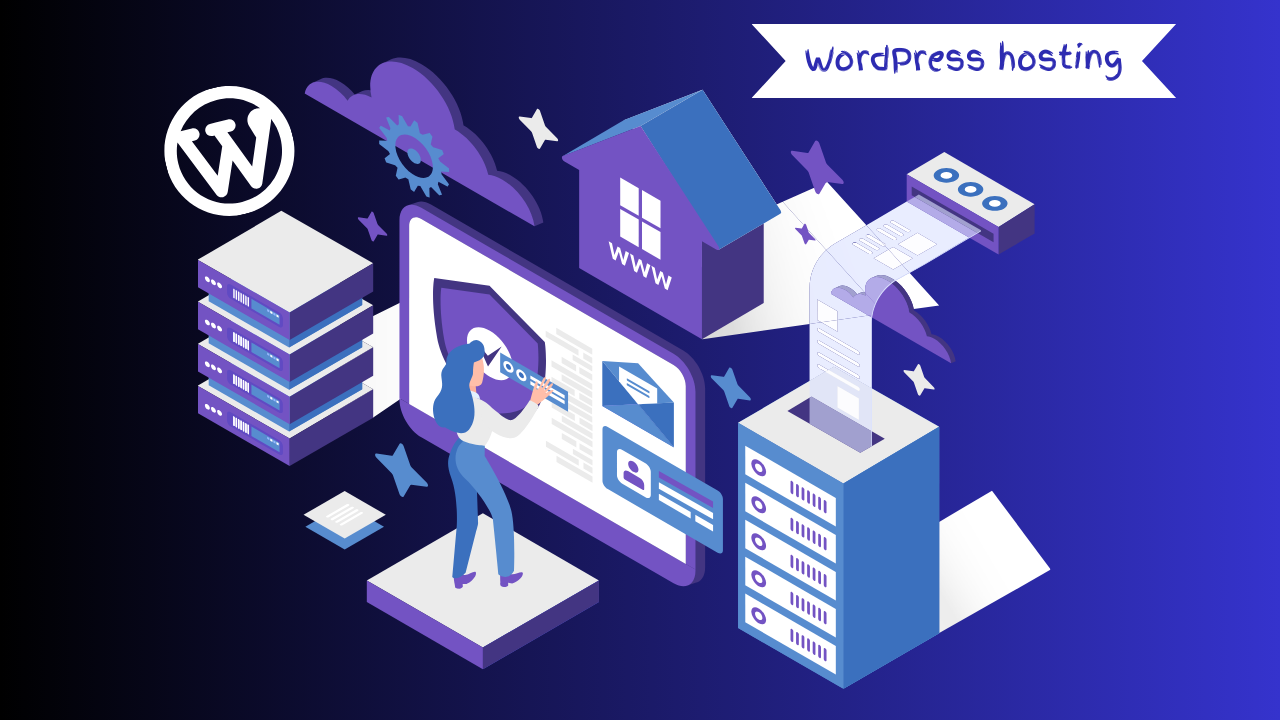Where We Get WordPress Hosting?

When it comes to setting up a WordPress website, choosing the right hosting provider is crucial. Your hosting choice can significantly impact your website’s performance, security, and overall user experience.
Selecting the right WordPress hosting provider requires careful consideration of factors such as performance, support, security, scalability, and budget. The provider you choose will play a significant role in the success of your website.
With the right hosting partner, you can create a fast, secure, and reliable WordPress website that meets your goals and satisfies your audience.
In this article, we’ll tell you some of the top WordPress hosting providers to help you make an informed decision.
What is WordPress Hosting?
WordPress hosting is a specialized hosting service tailored to meet the specific requirements of WordPress websites. It serves as the digital foundation on which your WordPress site is built. At its core, WordPress hosting provides the essential server space and resources needed to make your website accessible on the internet. Without hosting, your WordPress website would have no place to reside and wouldn’t be reachable to online visitors.
top WordPress hosting providers
WordPress hosting is your website’s essential backbone, ensuring it’s accessible, secure, and performs at its best. It’s the very foundation of your online presence. When selecting your hosting provider, think about your website’s specific needs and objectives to find the perfect match that aligns with your budget. The right hosting partner can be the key to your WordPress website’s success.
Some of the top WordPress hosting providers to help you make an informed decision.
| Hosting Providers List | |
|---|---|
| Bluehost | SiteGround |
| HostGator | DreamHost |
| WP Engine | InMotion Hosting |
| WPX Hosting | Hostinger |
| Kinsta | GreenGeeks |
List of Hosting Options suited for different types of websites.
Choosing the best hosting for a website depends on various factors, including the type of website, its traffic, budget, and specific requirements. Here’s a list of hosting options suited for different types of websites.
Shared Hosting
Shared hosting is a cost-effective hosting solution where multiple websites share resources on a single server. While it’s budget-friendly, it can lead to slower performance and limited customization options due to resource sharing.
- Best for: Small personal blogs, portfolios, and low-traffic websites.
- Pros: Affordable, easy to use, and suitable for beginners.
My Hosting Recommendations
WordPress Hosting
Specifically tailored for WordPress websites, this hosting type offers optimized performance, automatic updates, and easy management of WordPress installations, plugins, and themes, making it ideal for those looking to create and maintain WordPress-based sites with ease.
- Best for: WordPress-based websites and blogs of all sizes.
- Pros: Optimized for WordPress, often includes managed services and automatic updates.
My Hosting Recommendations
Virtual Private Server (VPS) Hosting
VPS hosting provides users with a dedicated portion of a virtual server, granting more control, flexibility, and resources compared to shared hosting. It strikes a balance between affordability and customization, making it suitable for businesses and website owners needing more power and customization.
Best for: Small to medium-sized businesses, growing websites, and moderate traffic.
Pros: Better performance and scalability compared to shared hosting.
My Hosting Recommendations
Dedicated Server Hosting
With dedicated hosting, users have an entire server exclusively at their disposal. This option offers maximum control, security, and performance but comes at a higher cost, making it suitable for large businesses and websites with high traffic demands.
Best for: Large e-commerce sites, enterprise-level applications, and high-traffic websites.
Pros: Full control over server resources, maximum performance, and security.
My Hosting Recommendations
| Liquid Web | OVH |
| Hostwinds | Hostinger |
Cloud Hosting
Cloud hosting relies on a network of virtual servers to deliver scalable resources on-demand. It ensures high availability, reliability, and scalability, making it an excellent choice for websites with varying traffic levels and resource needs.
Best for: Scalable websites and applications, startups, and businesses with fluctuating traffic.
Pros: Scalability, high uptime, pay-as-you-go pricing, and redundancy.
My Hosting Recommendations
| Amazon Web Services (AWS) | Google Cloud Platform (GCP) |
| Microsoft Azure | Hostinger |
Reseller Hosting
Reseller hosting allows individuals or businesses to purchase hosting resources and resell them to others. It’s an opportunity for entrepreneurs to start their hosting businesses, often with white-label solutions and management tools provided by the hosting provider.
Best for: Web designers, developers, and agencies who want to host multiple client websites.
Pros: Ability to manage multiple hosting accounts from a single dashboard.
My Hosting Recommendations
| A2 Hosting Reseller | WPX |
| SiteGround Reseller | Hostinger |
Managed Hosting
Managed hosting takes the burden of server management off the website owner’s shoulders. The hosting provider handles tasks such as security updates, backups, and performance optimization, allowing users to focus on their websites’ content and functionality.
Best for: Businesses looking for hands-off hosting with support and management.
Pros: High level of support, automatic updates, and maintenance.
My Hosting Recommendations
Free Hosting
Free hosting services offer a no-cost option for hosting websites. However, they often come with limitations, including limited resources, advertisements, and less control. They are suitable for personal projects or small websites but may not be ideal for businesses or high-traffic sites seeking reliability and customization.
Best for: Personal projects, testing, and learning.
Pros: Cost-free, suitable for small-scale projects.
My Hosting Recommendations
Remember that the best hosting choice can evolve as your website grows and changes. Assess your current needs, budget, and technical expertise when making a decision, and be prepared to upgrade or switch hosts if your requirements change over time.
In conclusion, the choice of WordPress hosting provider depends on your specific requirements and budget. Each of the providers mentioned above has its strengths and may be the right fit for your particular needs. Ultimately, take the time to research and select the one that aligns best with your website goals.
What is WordPress hosting?
WordPress hosting is a specialized hosting service designed to cater specifically to WordPress websites. It offers server environments optimized for the unique requirements of WordPress, ensuring better performance and security.
What’s the difference between regular hosting and WordPress hosting?
Regular hosting is a more generic hosting service that can host various types of websites. WordPress hosting, on the other hand, is specifically tailored to WordPress sites, offering features like one-click WordPress installation and optimized server configurations.
Do I need WordPress hosting for my WordPress website?
While it’s possible to host a WordPress site on regular hosting, using WordPress hosting is highly recommended. It’s optimized for WordPress, offering better performance, security, and support for WordPress-specific features.
How do I choose the right WordPress hosting provider?
To choose the right WordPress hosting provider, consider factors like your website’s size and traffic, your budget, and the level of support and features you require. Research providers, read reviews, and compare plans to make an informed decision.
Can I switch hosting providers for my WordPress site?
Yes, you can switch hosting providers for your WordPress site. Most hosting providers offer migration services to help you move your site smoothly. Be sure to back up your data and test your site after the migration to ensure everything is working correctly.


